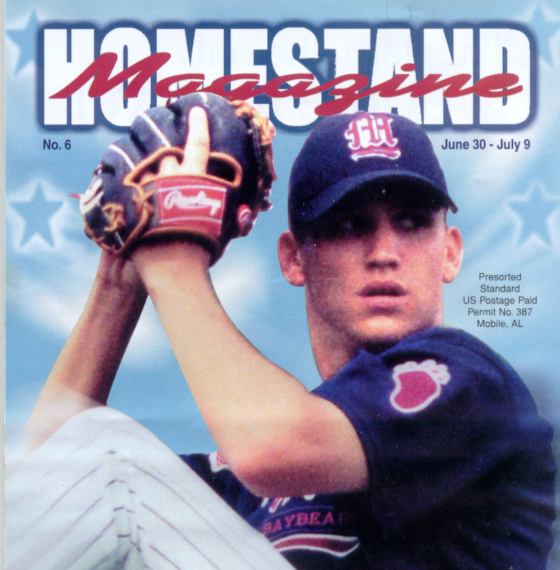
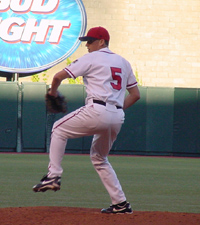
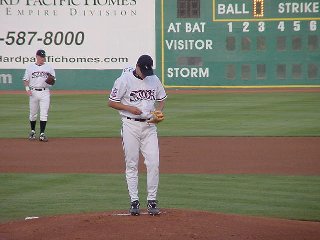
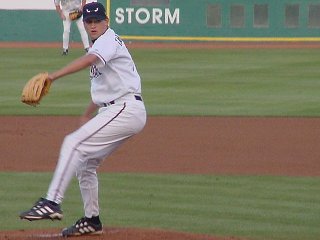
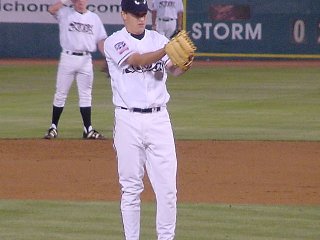

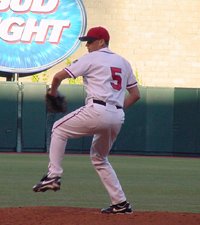



22 aug 01:
Tankersley in February
Dennis Tankersley likely won't pitch again until February, when he is to compete for a job in San Diego's rotation. The Class AAA right-hander is to have an MRI on his shoulder in San Diego today, but medical staff in Portland ruled out structural damage.
"It's precautionary," said general manager Kevin Towers. "More than anything, he's tired. He's been through a lot. To go from A ball to Double-A to the Futures Game to Triple-A – he's at an area where you want to back him off."
Tankersley threw 62 innings with Lake Elsinore, then 69 with Mobile (Ala.). He allowed 13 runs (11 earned) in 14 innings with Portland. The 22-year-old, who had arm problems as a Red Sox farmhand, is widely regarded as one of the top pitching prospects among all minor leaguers.
Minor league baseball profile
Saw Tankersley for the first time tonight, against a potent Mudville offense (Ben Broussard, Dane Sardinha, Josh Spoerl and Rainier Olmedo lead the charge for the Nine). Tankersley began today as the Cal League leader with a 0.40 ERA. Throwing 6 1/3rd innings of scoreless ball, Tankersley lowered that ERA down to 0.31. In 28 2/3rds innings this year, Tankersley has allowed just one earned run. Proving he is indeed human, he allowed three walks tonight--in his previous 22 1/3rd innings in 2001, he had yet to surrender a base-on-balls. Tankersley allowed 3 hits, while striking out 7, and picked up the win to improve his record to 3-1. Cal League batters are hitting .175 against him so far in 2001.
Tankersley's fastball was clocked tonight between 89-92 mph. His most impressive pitch, though, is a wicked slider that he was using as his money pitch throughout tonight's game. That slider is one of the most impressive ones I've seen in A-ball. Tankersley continuously went to that pitch on 2-strike counts throughout the game, yet Mudville hitters couldn't get their bats on it.
If you're a Red Sox fan, you've got to be grimacing at Tankersley's emergence. Last June, the Sox dealt Tankersley and SS Cesar Saba to San Diego for journeyman 3b Ed Sprague. Less than 2 months after the trade, the Red Sox released Sprague and he was resigned by San Diego--so Boston exchanged Saba and Tankersley for the "privilege" of renting Ed Sprague for 7 weeks--at Boston, Sprague hit .216 in 111 ABs. Ouch.
The 6' 2", 185-pounder just turned 22 in February. Dennis was a 1998 draft-and-follow pick in the 38th round by the Red Sox, after his freshman season at Meramec Community College in St. Louis, Missouri. He's a native of St. Charles, Missouri, which is a St. Louis suburb.



Q & A with Portland Beavers' righthander Dennis Tankersley
August 28, 2001
Dennis Tankersley
BOSTON (Ticker) -- As it looks right now, the Boston
Red Sox will forever rue the day that they traded away
yet another player who went on to achieve great things
in another uniform. Back in 1988, the Red Sox dealt
Class AA third baseman Jeff Bagwell for aging reliever
Larry Andersen. While Bagwell has gone on to become
one of the best hitters of his era, Andersen was out
of the organization the next year.
Last June the Red Sox, desperately in need of third
base help, traded righthander Dennis Tankersley to the
San Diego Padres for journeyman Ed Sprague. While
Sprague was released from the Red Sox after less than
two months in the organization, Tankersley has gone on
to great things in the Padres system.
The 22-year-old righthander was originally selected by
the Red Sox as a draft-and-follow in the 38th-round of
the 1998 draft. After signing in May of 1999,
Tankersley went 1-0 with a 0.76 ERA in 11 games in the
rookie-level Gulf Coast League. Last season, he was 5-
3 with Augusta of the Class A South Atlantic League
before being dealt to the Padres.
Since the trade, the 6-foot-2, 205-pound righty has
been nothing short of dominating. So impressive, in
fact, that he climbed from the Class A California
League to the Class AAA Pacific Coast League in a span
of just over two months. For the season, Tankersley is
10-4 with a 1.98 ERA. He fanned 173 batters in 136 1/3
innings.
Tankersley, who was shut down for the season in the
middle of the month with a tired arm, proved this
season what kind of pitcher he is and has the
potential to become. He will enter spring training of
2002 with a shot at the big league rotation and a
chance to show a certain organization in the Northeast
that it made one very big mistake last summer.
Q: You started the year with Class A Lake Elsinore and
pitched your way up to Class AAA. This must have been
the ride of your life this season?
A: Yeah. It's been amazing. Every time I get
somewhere, its seems like I'm only there about a
month, and then I go somewhere else. Every time you go
out (to the mound), you want to do your job and make
sure that you keep the team in the game. Every time
out, I would do something, and it would be like, "Man,
what am I going to do next game?" And I would do the
same thing, maybe a little bit better. It seemed like
every time out, I would do better. If they hit the
ball, it would be right at people. It was an amazing
ride for awhile.
Q: What was one thing in particular that was working?
Can you even explain it?
A: I think the mechanics were good when I was in A-
Ball. Then, when I got to Mobile, I started throwing a
little harder, and I don't know why. I don't know if
my arm was getting stronger, but my velocity picked up
a little bit, and I started throwing everything for
strikes. Last year, I was basically fastball, slider
and working on a changeup. After about 10-11 starts
(this season), I was able to get a good feel for my
changeup. I could throw it in any count, anytime. When
you have a guy who's looking for three pitches, it's
pretty tough to hit, and that's one of the reasons
that I've had success.
Q: When you got to Class AA Mobile, did you figure
that was kind of your resting point for the season?
A: Yeah, I did. Out of spring training, I kind of
thought that I would make the (Mobile) team, but they
told me to go to (Lake) Elsinore. When I got to
Mobile, I thought for sure I was going to finish the
season there, and then who knows what would happen
next year. Then, they told me I was going to Portland,
and I was pretty excited.
Q: We see different scouting reports, and they all say
that your fastball is around the mid-90s. But now,
you've added a little more juice. Is that increased
arm strength, or is that you added some weight or some
muscle?
A: I think it's a little bit of both. I think it's
maturing and getting older. I lifted pretty hard, and
I take care of my arm. I really do a lot of drill
stuff with the cords. I run and lift little weights.
It just started clicking (in Mobile) for about three
or four starts, and it progressively got harder.
Q: You mention that you've worked on your arm
strength. I guess there are different schools of
thought on this. You have the Roger Clemens philosophy
of slamming your pitching hand into the barrel of
grain, and then you have other guys who aren't that
big, who don't throw and don't do anything during the
offseason. Where would you fit into the offseason
program?
A: I'd say somewhere in the middle. I like to rest my
arm, but I like to lift. I don't lift heavy stuff. I
do a lot of repetitions. I lift my legs pretty hard. I
think you have to throw, in my opinion. I'm not going
to pick up a ball, because I'm not playing winter
ball. So, I know that I'm not going to pick up a ball
all of September and all of October, and then
I'll just get into it in November, like I did last
year.
Q: Someone has made the analogy that you are like
Pedro Martinez. What would you say to that?
A: As flattering as it is, I would never, ever think
that. He's arguably the best pitcher in baseball, and
arguably the best ever. I've got a long way to go and
a lot of things to do to even be mentioned in the same
sentence as him.
Q: What was your reaction to the trade last season?
A: I was disappointed at first. I thought it was a bad
thing. I knew they (San Diego) wanted a shortstop, and
they wanted a pitcher. I thought that I was going to
be a fill-in, just so I made the deal a little better
for the Padres, because I knew they wanted Cesar
(Saba) (who was also part of the deal). But when I got
(to the Padres organization), they welcomed me. After
about a week or so, I started to realize that they did
want me, and it was up to me to make a good first
impression, because I can really put myself on the map
here with this organization. So far, I think I've done
that.
Q: Where you disappointed in the fact that not only
did the Red Sox let you go, but they got nothing for
you?
A: Yeah. I think Dan Duquette knew what he needed on
the big league side, and I don't know if he knows his
minor leagues well or not. I can't say if he does or
doesn't. I can see where they didn't really have
anything invested in me. I had a good first year, but
it was only rookie ball, and that's how they probably
looked at it. I wasn't throwing well for the first
part when I was at Augusta. But, my last six starts, I
threw the ball really well. So that's why I was kind
of surprised. I think he did what he felt was best for
his big league team.
Q: Do you ever pitch with a vengeance against the Red
Sox for letting you go?
A: There have been times that I have. At the beginning
of the season, I started to get a little more credit
for what I was doing, but at the same time, people
were saying, "He's only in A-ball. He's 22." Kind of
hinting that I was better than these guys because I
was older. I wanted to prove a point that it didn't
matter where I was, that I could pitch and that Boston
made a mistake.
Q: Because you got traded, do you ever get the feeling
of rejection or failure?
A: A little bit. My name was never mentioned (by the
Red Sox in the trade), so I just thought that Dan
Duquette said, "This guy's not very good, so let's get
rid of him. Maybe we can sneak him in there." To tell
you the truth, I didn't know how to feel about it. I
talked with my dad and I said, "I don't know how to go
about this. Maybe I'm not that good." There's a lot of
negative stuff that popped into my head.
Q: What place have you liked better this season. Don't
go by performance. Go by scenery, and where you've
been able to spend time and make friends with your
teammates.
A: I'd have to say Lake Elsinore, because I did play
with a large majority of those guys at the end of last
year, and I was with the same coaching staff. I've
never been on a team like that. In pro ball, you want
to win as a team but you want to do well
(individually). But there, it's like a college team.
If a guy does bad and we win, he's generally happy.
That team was amazing to be around, so I would have to
say the Lake Elsinore team.
Q: How tough is it to get acclimated to five teams in
two years?
A: It's pretty tough. The Padres guys, I can't say
enough, because they welcomed me in. When you're the
new guy, they'll say, "Hey, what's up," but they don't
sit down and talk to you. When I got there (to Lake
Elsinore), if I was sitting on the bench, I was never
sitting alone. Someone would be coming to talk to me
and making me feel welcome. When I got to Mobile, I
knew those guys because I had worked out with most of
them. But here (Portland), these are all older guys,
anywhere from 25 or 26 to 30. We really don't have
many things in common. They've done a good job of
making me feel welcome.
Q: Have you been surprised by your success this season?
A: To have this much success...yeah. I've always been
confident in my ability and stuff, but, like I was
saying, anytime a guy would hit a ball hard, it would
be right at someone. It's been that kind of year. To
have good numbers, you've got to be lucky, too. You
have to have good stuff, but you've got to pitch
lucky. I'm not shocked by it, but it has been an
unbelievable season.
Q: What's the difference between the levels that
you've been at this season?
A: At Triple-A, any mistake you make, they hit hard.
Maybe it's because I didn't have my good stuff my last
couple of outings. But my second outing here
(Portland), I gave up five hits in the first inning,
and none of the balls were hit hard. If I made any
little mistake, if I didn't get it out far enough or
in far enough, they just fought it off and blooped it
in somewhere, whereas down at Double-A or Single-A,
they'd break their bat or swing and miss it. The guys
are a lot smarter. They set the pitchers up. It's not
just the pitchers setting them up.
Q: What has been your favorite sports moment thus far?
A: I would have to say going to the Futures Games (in
Seattle in July). Going into the season, I never would
have thought anything like that would have happened.
To get invited and pitch pretty well in it was
awesome. My wife and I got to stay out there a few
extra days and go to the home run derby and the big
league All-Star Game. That really put a stamp on it. I
know where I want to be and I know what I want to do,
and that's baseball.
Q: What was it like being in there with all those
other minor league players and then you have the major
leaguers there as well.
A: Just looking around, these are the same guys I read
about in "Baseball America" and see in magazines. That
was also a reality check for me because I've come a
long way, and the hard work has finally paid off. It
was a great honor, and I'm really happy they invited
me. It's all new to me. That's why it's hard to take
in. In high school, I had success like that. But in
pro ball, it's pretty amazing.
Q: Is that just your humble nature and the way that
you are?
A: Yeah. Prime example would be my last two starts (in
Portland). If I start thinking that just my ability
alone and my stuff is going to get me through those
couple of games, it's not. I still have to make
pitches. I still have to think about what I'm doing
out there, and I can't make mistakes.
Q: Last question, and we've been asking everyone this
all season. Do you have a favorite baseball movie or a
favorite sports movie?
A: I guess I'd have to say "Bull Durham" or "Field of
Dreams". I remember watching "Field of Dreams" all the
time when I was younger, and then we played in a
baseball tournament in Iowa, and I got to see the
field, so that was pretty special. So, I think that's
one of my all-time favorites.
Q: As a baseball player, when you see a movie
like "Major League", like "Bull Durham" or like "Field
of Dreams", when you actually get to the higher level,
do you learn to not only appreciate the movie a little
more but also understand the nostalgia behind it?
A: Yeah, I think so. I think you try so hard just to
get there that you don't realize what you're doing and
the history of your minor league team. Some of these
teams have been around for 100 years. I know that
Portland's a very old organization. Once you get
there, and you're established and not nervous about
getting sent down, it starts to set in.
